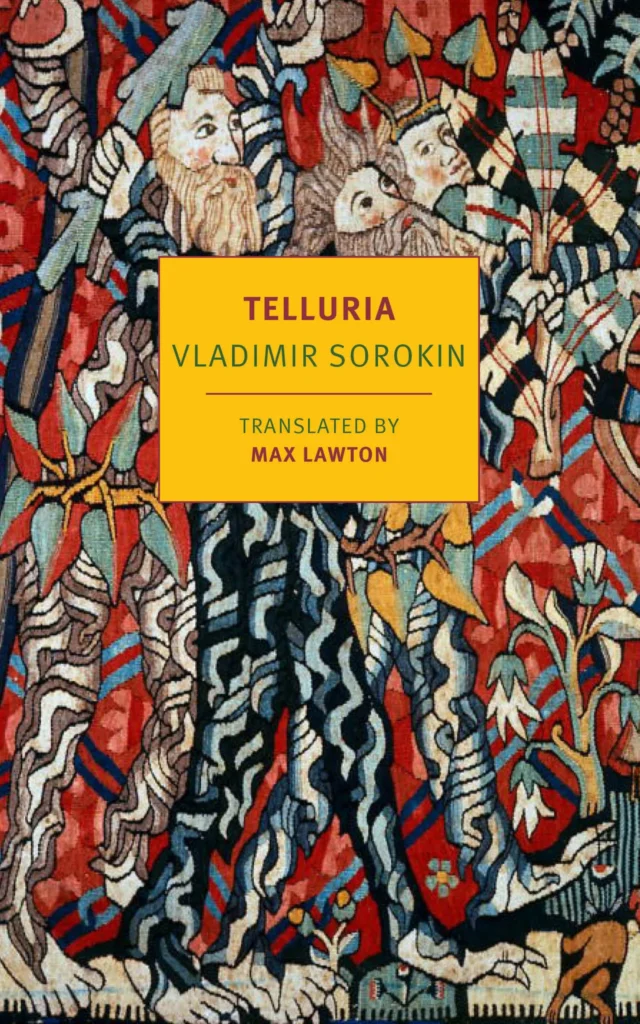Telluria by Vladimir Sorokin
I’ve been waiting a while for Strange Horizons to run my review of Vladimir Sorokin’s 2013 novel Telluria, published last year by NYRB Classics with a translation by Max Lawton. I wasn’t familiar with Sorokin, a Russian writer who began his career poking at the foibles of the Soviet Union, and has continued to do the same with Putin’s Russia, before picking up this book. But the premise intrigued me, not least because it seemed to intersect with science fiction. Telluria is part of a loose sequence of novels which all take place in a post-post-Soviet setting which Sorokin has dubbed the New Middle Ages, in which familiar geopolitical entities have fractured and new battle lines have been drawn. In this novel, Sorokin introduces the titular drug, which produces euphoria by transporting users to a world where their deepest desires are realized—desires that can be political or ideological as well as personal.
The drug novel is a familiar form in science fiction, from Brave New World (1932) to Fahrenheit 451 (1953). But whereas such stories tend to envision drugs or other addictive activities as a means of narcotizing or distracting the populace, in Telluria the drug is usually the province of the elites. For most ordinary people, it is too expensive to acquire, and the services of the professional who can administer it safely (known as a “carpenter”) are restricted.
…
The elites in the novel—whether viewed from afar by subjects to whom they are little more than an abstraction, or seen in intimate moments in the corridors of power—represent a wide range of political opinion and power. They are partisans fighting revolutionary wars, philosophers getting bogged down in squabbles over ideological purity, or autocrats with total power over not only their citizens’ material circumstances but the way in which they see the world. They are radicals and reactionaries. What unites them, in all their far-flung, vastly different circumstances and worldviews, is having dreamt a new world and brought it to fruition. And what made that dream possible, the novel eventually concludes, is tellurium. The drug that takes you to another, fully-formed world, and leaves you with the conviction of being able to make it a reality.
Science fiction and revolutionary politics have always had a certain overlap. The act of imagining a new world, new forms of government and new social organizations, is an inherently SFnal one. The Soviets in the early parts of the twentieth century had a particular fondness for science fiction, with its vision of a technologized future liberating the masses from drudgery and the rule of the elites. Theodor Herzl’s formative Zionist tract, Altneuland (1902), which imagines the future Jewish state as a socialist utopia (while conveniently ignoring the Palestinian inhabitants of the region), is often described as a work of science fiction. One novel I found myself thinking of while reading Telluria was Kim Stanley Robinson’s The Ministry for the Future (2020), which also delivers short, multifaceted snippets of an ongoing project to transform the world—in its case, away from climate catastrophe. And Ursula K. Le Guin is often credited with describing the act of imagining a post-capitalistic world as both revolutionary and SFnal.
Telluria literalizes this connection through its titular drug. And yet in the world of the novel, this is rarely a good thing. The dreams that have been allowed to overwrite its reality are often regressive, megalomaniacal, even phantasmagorical. We see this, of course, in reality as well. What is the ongoing Russian invasion of Ukraine but an attempt to write on the fabric of reality a fantasy of the resurgence of the Russian empire?
It’s a great book, and I think many readers here will enjoy it. For more book recommendations, see several recent posts on my blog: on last year’s Clarke winner Deep Wheel Orcadia, a verse novel in the Orkney dialect about life on an economically struggling space station; on Shehan Karunatilaka’s Booker-winning The Seven Moons of Maali Almeida and his short story collection The Birth Lottery; and on my first great 2023 read, Paul B. Rainey’s magnificent, slyly SFnal graphic novel Why Don’t You Love Me?



